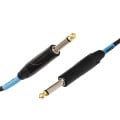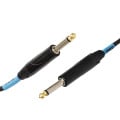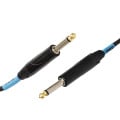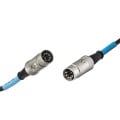- Opis
-
Szczegóły
Behringer CAT - legendarny duofoniczny syntezator analogowy w formacie eurorack z podwójnym VCO, 4 symultanicznymi przebiegami fal, zewnętrznym procesorem sygnału i 16-głosowym Poly-Chain
Najważniejsze cechy:
- Syntezator analogowy z podwójną konstrukcją VCO pozwala na tworzenie niezwykle tłustych analogowych brzmień
- Autentyczna reprodukcja oryginalnych obwodów "CAT SRM II" z dobieranymi półprzewodnikami i układami JFET
- W pełni analogowa ścieżka sygnału oparta na autentycznych konstrukcjach VCO, VCF i VCA
- 4 zróżnicowane i symultaniczne kształty fali oscylatora (piła/trójkąt/puls/kwadrat)
- Tryby: duofoniczny i parafoniczny zapewniające niezależną kontrolę oscylatorów
- Klasyczny filtr (dolnoprzepustowy z peak/resonance) z opcją self-resonance
- Filtr może być modulowany z 6 różnych źródeł z 2 tłumikami głębokości modulacji
- Dedykowany i analogowy LFO z jednoczesnym kształtem oscylatora piłokształtnego i kwadratowego
- 2 generatory obwiedni do modulacji VCF i VCA
- Generator szumu białego znacznie rozszerza generowanie przebiegu
- 16-głosowy Poly Chain umożliwia łączenie wielu syntezatorów dla maksymalnie 16-głosowej polifonii
- Kompletne rozwiązanie eurorack. Moduł można przenieść do standardowej skrzynki eurorack
- 47 elementów sterujących zapewnia bezpośredni dostęp do wszystkich ważnych parametrów w czasie rzeczywistym
- Wejście audio daje możliwość obróbki zewnętrznego sygnału dźwięku w celu zwiększenia kreatywności
- Zewnętrzne wejścia i wyjścia sterujące (High Note CV, Low Note CV, Gate, Filter itp.)
- Kompleksowa implementacja MIDI z wyborem kanału MIDI i priorytetu głosu
- Zaprojektowany w Wielkiej Brytanii
- Syntezator analogowy z podwójną konstrukcją VCO pozwala na tworzenie niezwykle tłustych analogowych brzmień
- Dostawa
-
Szczegóły dostawy produktu Behringer CAT - syntezator analogowy
Wysyłka z Warszawa, Polska.
Dostawa do
Jeżeli chcesz zobaczyć dokładne metody dostawy dostępne w Twojej lokalizacji, uzupełnij powyższe pola.
- Zadaj pytanie
-
Zadaj pytanie odnośnie produktu
- Recenzje (2)
-
5.0 / 5
2 recenzje
Recenzje klientów
-
Jakość Trwałość Wygląd Cena Ten syntezator mnie bardzo zaskoczył. Bazując na opiniach innych, kupiłem go jako zamiennik innego syntezatora Odyssey a gdy go zacząłem używać okazało się że dostałem o wiele więcej. Filtr brzmieniowo przypomina Rolandowskie filtry i świetnie się nadaje do tworzenia tego typu barw. Bardzo blisko mu do SH-101. Oscylatory dają spore pole do popisu a modulacja jest łatwo dostępna i prze to że jest skonfiguorwana tak a nie inaczej, łatwo jest tworzyć brzmienia o których nie pomyślało by się na innych syntezatorach.
Bardzo fajny syntezator, przekroczył moje oczekiwania.Odpowiedź sprzedawcyDrogi Mirosławie,
Dziękujemy za pozytywną opinię na temat naszego produktu - Behringer CAT - Legendary Duophonic Analog Synthesizer! Jesteśmy zachwyceni, że syntezator przekroczył Twoje oczekiwania i pomógł Ci w tworzeniu niesamowitych brzmień. Cenimy sobie Twoją opinię i cieszymy się, że nasz produkt spełnił Twoje potrzeby. Zachęcamy do odwiedzenia nas ponownie - zawsze chętnie pomożemy w wyborze sprzętu audio.
Pozdrawiamy,
Zespół SuperSound<|im_sep|>Przydatne (0) -
Jakość Trwałość Wygląd Cena Świetna cena jak na taki sprzęt
Przydatne (0)
-
O producencie BEHRINGER
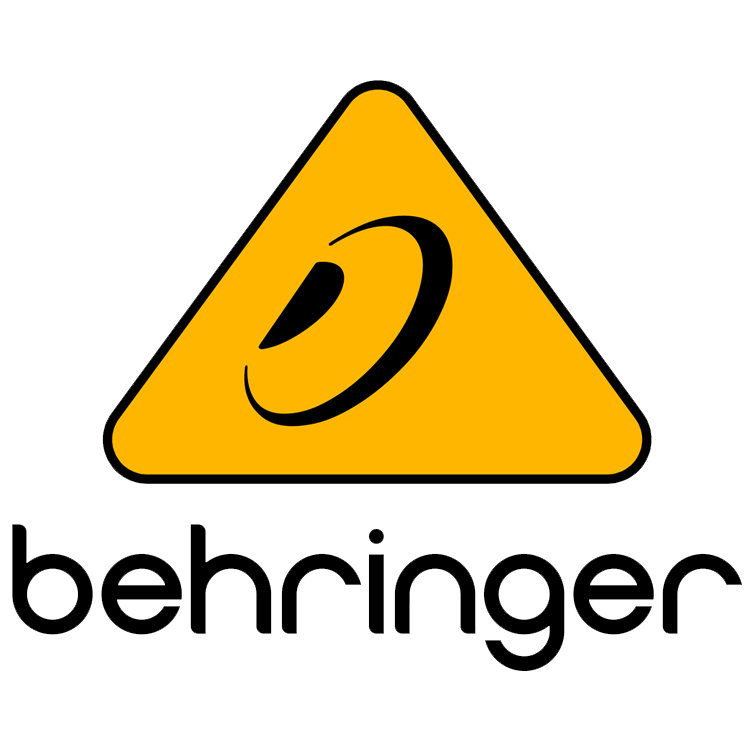
Behringer to niemiecka firma założona w 1989 roku przez Uli'ego Behringera. Marka zajmuje się produkcją m.in. mikserów, gitar, mikrofonów, głośników, słuchawek czy systemów bezprzewodowych.
Firma
- Siedziba producenta: Niemcy
- Średnia ocena produktów: 4.7
Produkty
- Liczba produktów: 693
Statystyki napraw










